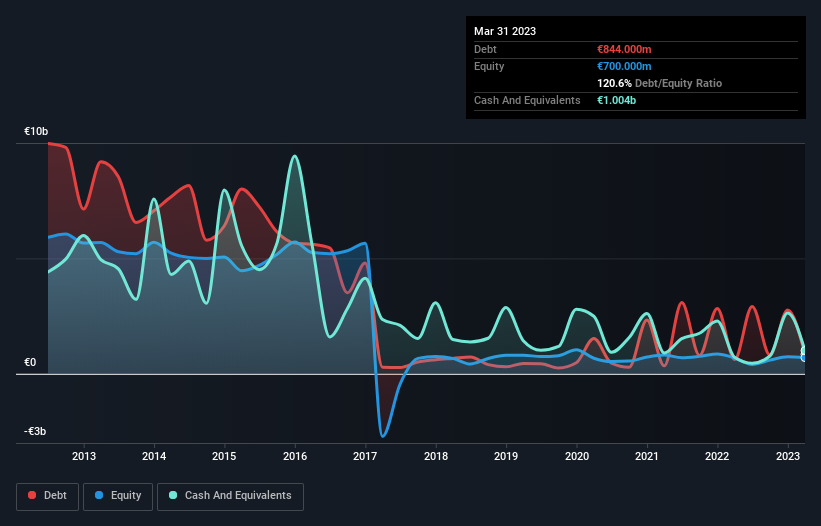Warren Buffett famously said, 'Volatility is far from synonymous with risk.' It's only natural to consider a company's balance sheet when you examine how risky it is, since debt is often involved when a business collapses. As with many other companies Ceconomy AG (ETR:CEC) makes use of debt. But should shareholders be worried about its use of debt?
Why Does Debt Bring Risk?
Debt is a tool to help businesses grow, but if a business is incapable of paying off its lenders, then it exists at their mercy. Part and parcel of capitalism is the process of 'creative destruction' where failed businesses are mercilessly liquidated by their bankers. While that is not too common, we often do see indebted companies permanently diluting shareholders because lenders force them to raise capital at a distressed price. Of course, the upside of debt is that it often represents cheap capital, especially when it replaces dilution in a company with the ability to reinvest at high rates of return. The first step when considering a company's debt levels is to consider its cash and debt together.
See our latest analysis for Ceconomy
How Much Debt Does Ceconomy Carry?
You can click the graphic below for the historical numbers, but it shows that as of March 2023 Ceconomy had €844.0m of debt, an increase on €617.0m, over one year. But it also has €1.00b in cash to offset that, meaning it has €160.0m net cash.

How Healthy Is Ceconomy's Balance Sheet?
We can see from the most recent balance sheet that Ceconomy had liabilities of €6.62b falling due within a year, and liabilities of €2.60b due beyond that. Offsetting these obligations, it had cash of €1.00b as well as receivables valued at €1.69b due within 12 months. So its liabilities total €6.53b more than the combination of its cash and short-term receivables.
The deficiency here weighs heavily on the €1.07b company itself, as if a child were struggling under the weight of an enormous back-pack full of books, his sports gear, and a trumpet. So we'd watch its balance sheet closely, without a doubt. After all, Ceconomy would likely require a major re-capitalisation if it had to pay its creditors today. Ceconomy boasts net cash, so it's fair to say it does not have a heavy debt load, even if it does have very significant liabilities, in total.
The bad news is that Ceconomy saw its EBIT decline by 15% over the last year. If earnings continue to decline at that rate then handling the debt will be more difficult than taking three children under 5 to a fancy pants restaurant. When analysing debt levels, the balance sheet is the obvious place to start. But it is future earnings, more than anything, that will determine Ceconomy's ability to maintain a healthy balance sheet going forward. So if you want to see what the professionals think, you might find this free report on analyst profit forecasts to be interesting.
Finally, while the tax-man may adore accounting profits, lenders only accept cold hard cash. Ceconomy may have net cash on the balance sheet, but it is still interesting to look at how well the business converts its earnings before interest and tax (EBIT) to free cash flow, because that will influence both its need for, and its capacity to manage debt. Happily for any shareholders, Ceconomy actually produced more free cash flow than EBIT over the last three years. That sort of strong cash generation warms our hearts like a puppy in a bumblebee suit.
Summing Up
Although Ceconomy's balance sheet isn't particularly strong, due to the total liabilities, it is clearly positive to see that it has net cash of €160.0m. The cherry on top was that in converted 332% of that EBIT to free cash flow, bringing in €847m. Despite the cash, we do find Ceconomy's level of total liabilities concerning, so we're not particularly comfortable with the stock. There's no doubt that we learn most about debt from the balance sheet. However, not all investment risk resides within the balance sheet - far from it. Case in point: We've spotted 3 warning signs for Ceconomy you should be aware of.
At the end of the day, it's often better to focus on companies that are free from net debt. You can access our special list of such companies (all with a track record of profit growth). It's free.
New: AI Stock Screener & Alerts
Our new AI Stock Screener scans the market every day to uncover opportunities.
• Dividend Powerhouses (3%+ Yield)
• Undervalued Small Caps with Insider Buying
• High growth Tech and AI Companies
Or build your own from over 50 metrics.
Have feedback on this article? Concerned about the content? Get in touch with us directly. Alternatively, email editorial-team (at) simplywallst.com.
This article by Simply Wall St is general in nature. We provide commentary based on historical data and analyst forecasts only using an unbiased methodology and our articles are not intended to be financial advice. It does not constitute a recommendation to buy or sell any stock, and does not take account of your objectives, or your financial situation. We aim to bring you long-term focused analysis driven by fundamental data. Note that our analysis may not factor in the latest price-sensitive company announcements or qualitative material. Simply Wall St has no position in any stocks mentioned.
About XTRA:CEC
Undervalued with reasonable growth potential.
Similar Companies
Market Insights
Community Narratives





